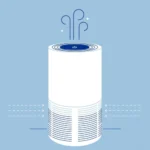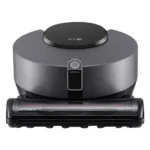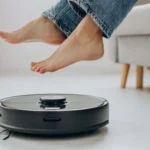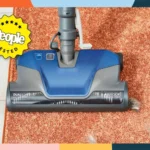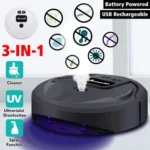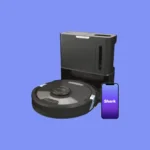As an asthma patient, keeping your home clean and free of dust and allergens can be a challenge. Vacuum cleaning is an essential part of maintaining a clean environment, but traditional vacuum cleaners may not be efficient in providing the necessary standard for someone who has asthma. If you’re in this situation, you may want to consider investing in a new type of vacuum – a smart vacuum cleaner with HEPA filtration. This technology offers a variety of features that can help improve your air quality and reduce asthma triggers. In this article, we’ll detail the benefits of smart vacuum cleaners with HEPA filtration for asthma patients and give you some tips on how to choose the best one for your needs. So, if you’re looking for a way to not only clean your home but also help you manage your asthma, let’s dive in.
How Asthma Patients Can Benefit from Smart Vacuum Cleaners with HEPA Filtration
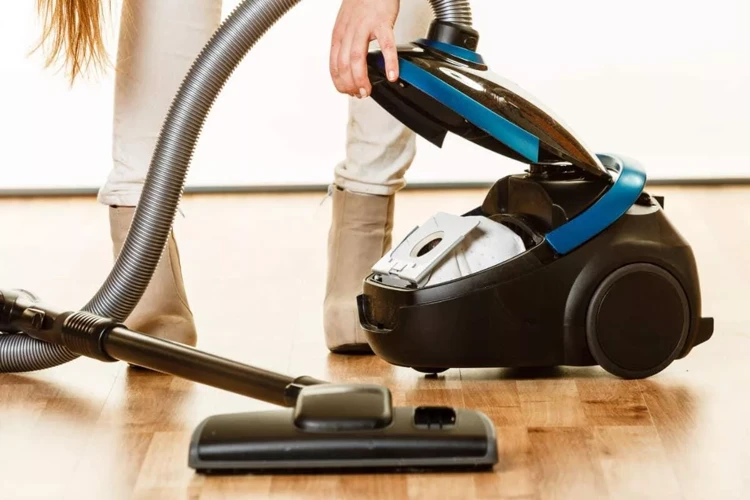
Living with asthma can be a struggle, particularly when it comes to keeping your living environment clean and healthy. Having an effective cleaning solution is crucial to reduce the triggers of asthma attacks. That’s where smart vacuum cleaners with HEPA filtration come in. These innovative devices can transform the cleaning experience for asthma patients by providing numerous benefits, including reducing triggers of asthma, improving air quality, offering efficient cleaning, and boasting smart technology. By investing in a HEPA filter smart vac, asthma patients can dramatically reduce their symptoms and breathe a little easier.
Reduced Triggers of Asthma
When it comes to managing asthma, controlling triggers is crucial in order to prevent an attack. Smart vacuum cleaners with HEPA filtration can significantly reduce triggers of asthma, making them an important tool in managing the condition. Here are some of the ways they can do this:
- Eliminating Dust and Allergens: Smart vacuum cleaners with HEPA filtration are designed to trap even the smallest particles of dust, pet dander, and other allergens that can trigger asthma. HEPA filters are capable of trapping 99.97% of all particles that are 0.3 microns or larger, meaning they can capture microscopic allergens that are often missed by regular vacuum cleaners.
- Cleaning Without Agitating Allergens: Traditional vacuum cleaners can stir up dust, pollen, and other allergens, making them airborne and increasing the risk of an asthma attack. Smart vacuum cleaners with HEPA filtration, on the other hand, are designed to effectively clean carpets and floors without agitating these allergens, helping to keep them out of the air you breathe.
- Reducing Indoor Air Pollution: HEPA filtration is effective not only in removing allergens but also in reducing other indoor air pollutants such as cigarette smoke, cooking fumes, and volatile organic compounds (VOCs). By removing these triggers, smart vacuum cleaners with HEPA filtration can help create a cleaner, healthier living environment for asthma patients.
Investing in a smart vacuum cleaner with HEPA filtration can be a simple yet effective step in managing asthma by reducing triggers in the home. By eliminating allergens, cleaning without agitation, and reducing indoor air pollution, these vacuum cleaners can help keep asthma symptoms at bay.
Improved Air Quality
Having clean air is essential for everyone, but especially important for those with asthma. Smart vacuum cleaners with HEPA filtration are designed to improve air quality by removing tiny particles, like dust and pet dander, from the air.
HEPA filters – High Efficiency Particulate Air filters – have become standard in many vacuums due to their ability to catch even the smallest of particles. They have been proven to be effective in reducing indoor air pollution, which can be a significant trigger for asthma sufferers. HEPA filters can trap allergens, dust mites, and pollen, reducing potential asthma triggers that might otherwise be circulating in the air.
When considering a smart vacuum cleaner, the best models have multiple layers of filtration. HEPA filtration should be considered the minimum level of filtration that you use in a vacuum, especially for asthma patients. The filters must be regularly cleaned or replaced for the vacuum to work effectively. By replacing the HEPA filter regularly, you can be sure that the vacuum will continue to remove pollutants from the air and provide a clean and safe environment for the asthmatic.
It’s also important to note that while HEPA filters are very effective, they are not the only factor in improving air quality. An effective smart vacuum cleaner will have a powerful suction system that can pick up a variety of allergens and particles from the floor, ensuring that the air is cleaner and easier to breathe.
A smart vacuum cleaner with HEPA filtration can greatly improve the air quality indoors, making it easier for people with asthma to manage their symptoms and reduce asthma attacks.
Efficient Cleaning
Efficient cleaning is a significant benefit of smart vacuum cleaners with HEPA filtration for asthma patients. These vacuum cleaners are equipped with intelligent technology, which allows them to clean more effectively and saves time. They come with powerful motors that provide strong suction power to capture even the smallest particles, including pet hair, pollen, and dust mites.
Smart vacuums with HEPA filters have unique features that make them stand out from traditional vacuum cleaners. The following table summarizes some of the reasons why smart vacuums are more efficient:
| Features | Description |
|---|---|
| Automatic cleaning | Smart vacuums can be scheduled to start cleaning at a particular time, so you don’t have to worry about turning them on manually. |
| Navigation sensors | Smart vacuums have navigation sensors that allow them to detect obstacles and avoid them. They can easily move around furniture, carpets, and other obstacles in the room. |
| Edge cleaning | Many smart vacuums come with edge cleaning mode, which allows them to focus on cleaning the corners and edges of the room. |
| Virtual Walls | Virtual Walls are boundary markers that restrict the vacuum cleaner from going into certain areas of the room. This feature can help the vacuum cleaner clean only the areas you want. |
These features make smart vacuum cleaners with HEPA filters more efficient than traditional vacuum cleaners. By reducing the time taken to clean and making the process more effortless, they can be a real boon for asthma patients, whose lungs can be quickly impacted by particles such as pet hair, dust, and allergens.
If you’re looking to buy a vacuum cleaner with HEPA filtration, consider checking out the smart vacuums with HEPA filters. They offer improved air quality, reduced asthma triggers, and efficient cleaning, and are equipped with features that make them a better choice for asthma patients.
Smart Technology
Smart Technology has made many appliances more convenient and user-friendly, and vacuum cleaners are no exception. A Smart Vacuum Cleaner can connect to Wi-Fi and be controlled remotely via a smartphone or voice-activated device, making it easier for asthma patients to use without having to manually operate it.
Some Smart Vacuum Cleaners have advanced features such as mapping and scheduling, which can help with efficient cleaning and can be especially beneficial for asthma patients. With mapping technology, the vacuum can create a virtual map of the household and avoid obstacles like furniture, stairs, or rugs that may cause allergens to spread in the air. This way, the vacuum can focus on areas that are more prone to trigger asthma symptoms.
Below is a table summarizing the benefits of Smart Technology in a vacuum cleaner for asthma patients.
| Benefits of Smart Technology in Vacuum Cleaners for Asthma Patients |
|---|
| Remote control: Asthma patients can operate the vacuum cleaner from a smartphone, without having to manually adjust settings. |
| Mapping: The vacuum cleaner can create a digital map of the home, avoiding furniture, rugs or carpets that could trigger asthma symptoms. |
| Scheduling: The vacuum cleaner can be scheduled to clean at specific times or intervals, reducing the need for manual operation and ensuring consistent cleaning. |
So if you are an asthma patient searching for a vacuum cleaner to keep your home clean and allergen-free, consider investing in a Smart Vacuum Cleaner with HEPA Filtration. These vacuums not only have advanced technology for more efficient cleaning but also possess advanced filtration method that captures more pollen, dust, and other potential allergens. By choosing a vacuum cleaner with appropriate filtration and smart technology, you can enjoy a clean and healthier home without exacerbating your asthma symptoms.
To learn more about HEPA Filter Vacuums and their importance for asthma patients, check out our guide on HEPA Filter Vacuum Cleaner. Alternatively, if you are interested in finding a vacuum with a combination of HEPA filtration and smart technology, check out our list of HEPA Filter Smart Vacuums and Clean Smart Vacuum with HEPA Filter.
Features to Look for in a Smart Vacuum Cleaner for Asthma Patients
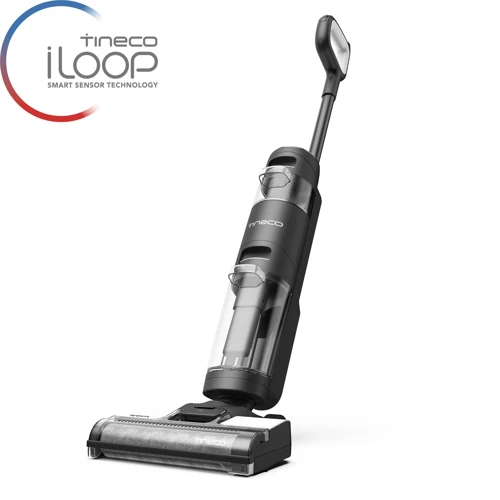
When considering purchasing a smart vacuum cleaner for asthma patients, there are important features that should be taken into consideration. These features can make a huge difference in the vacuum’s effectiveness and ability to address the unique needs of those with asthma. From the strength of the suction to the advanced technology, it is crucial to look for certain features that will make the process of cleaning easier and healthier for asthma patients. Let’s explore the key features to keep in mind when looking for the perfect vacuum for those with asthma.
HEPA Filtration
One of the most important features to look for in a smart vacuum cleaner for asthma patients is HEPA filtration. HEPA stands for High Efficiency Particulate Air and it is considered the gold standard in air filtration technology. HEPA filters are designed to trap particles as small as 0.3 microns in size, including dust mites, pollen, pet dander, and even some viruses.
Here are some reasons why HEPA filtration is beneficial for asthma patients:
- HEPA filters can help reduce the number of asthma triggers in your home by capturing allergens that can cause respiratory irritation.
- HEPA filters can also improve indoor air quality by removing fine particles that contribute to pollution and can aggravate asthma symptoms.
- HEPA filtration is especially important for asthma patients who are sensitive to airborne allergens, as these can cause an asthma attack or exacerbate existing symptoms.
When shopping for a smart vacuum cleaner with HEPA filtration, make sure to check that the filter is actually HEPA certified. Some vacuum cleaners may have filters that look like HEPA filters, but without the certification, they may not be as effective at capturing airborne particles.
Additionally, it’s important to note that even with HEPA filtration, vacuum cleaners can still emit fine dust particles. It’s recommended to use a vacuum cleaner with a sealed system to prevent these particles from escaping back into the air. Some vacuum cleaners also come with additional filters, such as pre-filters or carbon filters, that may further enhance air quality.
Wattage and Suction Power
When choosing a smart vacuum cleaner with HEPA filtration for asthma patients, it is important to pay attention to wattage and suction power. These two factors are essential when it comes to efficient cleaning and thorough removal of dust, dirt, and allergens from your home.
Wattage refers to the amount of power the vacuum cleaner motor uses to produce suction. Vacuums with higher wattage have stronger motors and thus, higher suction power. This is crucial for removing trapped allergens and dust from carpets, rugs, and upholstery.
However, a higher wattage vacuum cleaner doesn’t always mean it is the best choice. Firstly, some high wattage vacuums can be noisy, which may not be ideal for asthma patients who are sensitive to loud noises. Additionally, some high wattage vacuums may consume more energy, leading to higher electricity bills.
Suction power is the force at which the vacuum cleaner pulls in debris from the surface being cleaned. It is measured in air watts and is an important factor to consider as higher suction power ensures the vacuum effectively picks up dust and allergens.
When comparing vacuum cleaners, it’s worth noting that other factors such as the shape and type of brush roll as well as the type of filter used can affect suction power. For instance, if the brush rolls in a vacuum cleaner are stiff and tightly packed together, they may require more suction power to turn and pick up dirt. Also, if the filter is clogged, suction power can be reduced, leading to inefficient cleaning.
When looking for a smart vacuum cleaner with HEPA filtration for asthma patients, consider choosing a model with an optimal wattage level and suction power suitable for your needs and budget. A comparative table summarizing different vacuum characteristics can help you identify the right vacuum cleaner that fits your specific needs.
Multiple Cleaning Modes
As an asthma patient, you need a vacuum cleaner that can effectively clean your home while minimizing the risk of allergen exposure. One of the features to look for in a smart vacuum cleaner for asthma patients is multiple cleaning modes. Let’s take a closer look at what this means.
A vacuum cleaner with multiple cleaning modes allows you to customize the cleaning process according to the type of surface you’re cleaning. This is important because different surfaces require different cleaning techniques. For example, a carpet may require a deep clean with high suction power, while a hardwood floor may need a gentler touch to avoid scratches or damage.
Here are some of the cleaning modes that a smart vacuum cleaner may offer:
| Cleaning Mode | Description |
|---|---|
| Auto | This mode automatically adjusts the suction power and cleaning intensity based on the surface being cleaned. It’s a great option if you have mixed flooring in your home. |
| Spot | This mode focuses on a specific area for deep cleaning. It’s useful for removing stubborn dirt or stains. |
| Edge | This mode concentrates on cleaning along the edges and corners of the room, where dirt tends to accumulate. |
| Max | This mode provides maximum suction power for deep cleaning of carpets or heavily soiled areas. |
Having multiple cleaning modes not only improves the vacuum cleaner’s overall cleaning performance, but also allows asthma patients to customize the cleaning process according to their specific needs. This can help minimize exposure to allergens and reduce the risk of asthma triggers.
When shopping for a smart vacuum cleaner with HEPA filtration for asthma patients, be sure to look for one with multiple cleaning modes that fit your cleaning needs.
Smartphone Connectivity
Smartphone connectivity is a feature that adds convenience and flexibility to using a smart vacuum cleaner with HEPA filtration. With this feature, users can control the vacuum cleaner using their smartphones, enabling them to schedule cleaning, track cleaning progress, and adjust cleaning modes and settings from virtually anywhere.
Here are some key benefits of smartphone connectivity with regards to smart vacuum cleaners for asthma patients:
- Remote control: Using a smartphone app, users can easily start, pause, stop or adjust the cleaning of their smart vacuum cleaner without having to be physically present. This is particularly useful for those times when an asthma patient needs to stay out of the room during the cleaning process to avoid any potential triggers.
- Customizable settings: Most smart vacuums come with customizable settings, which can be configured using a smartphone app. For instance, users can choose the suction power, set cleaning schedules, and select cleaning modes that are specifically designed for asthma patients. With the customizable settings, asthma patients can be assured that their home environment is being thoroughly cleaned to meet their specific needs, thus reducing the chances of experiencing asthma triggers.
- Notifications and alerts: Another important feature of smartphone connectivity with regards to smart vacuum cleaners for asthma patients is the ability to receive notifications and alerts. Users will receive alerts if the vacuum cleaner is nearing the end of a cleaning cycle. They will also receive notifications when the dustbin needs to be emptied or the filter needs to be changed. This ensures that the vacuum cleaner is always working effectively and efficiently, reducing the chances of triggering asthma symptoms.
- Compatibility: It’s important to note that not all smart vacuum cleaners are compatible with all smartphones. Before purchasing a smart vacuum cleaner, asthma patients should ensure that it is compatible with their smartphone’s operating system.
Smartphone connectivity is a valuable feature when it comes to using smart vacuum cleaners with HEPA filtration for asthma patients. It provides users with more control, flexibility, and customization options, as well as vital notifications and alerts that help to minimize the risk of asthma triggers. It is recommended that asthma patients consider this feature when shopping for a smart vacuum cleaner.
Quiet Operation
When looking for a smart vacuum cleaner with HEPA filtration for asthma patients, it’s important to consider the noise level. A vacuum cleaner that produces excessive noise can be a major trigger for asthma attacks, especially if you have young children, pets or if you live in an apartment or a small house.
Quiet Operation is crucial for vacuum cleaners designed for asthma patients as it ensures minimal disturbance and keeps noise levels to a minimum. The quieter the vacuum, the less likely it is to trigger an asthma attack or cause any unnecessary stress to people in its vicinity.
Many modern smart vacuum cleaners come with various noise reduction features, including advanced sound insulation, noise-dampening materials, and redesigned air flow systems. These features help to reduce the amount of noise the vacuum creates, making them ideal for families with asthma patients.
Below is a table showing some of the top smart vacuum cleaners with HEPA filtration and their noise levels:
| Vacuum Cleaner | Noise Level (dB) |
|---|---|
| Dyson Cyclone V10 Absolute | 72 |
| iRobot Roomba i7+ | 55 |
| Shark IQ RV1001AE | 78 |
| Eufy RoboVac 11S | 55 |
As you can see, some vacuum cleaners are significantly quieter than others. The Dyson Cyclone V10 Absolute has a noise level of 72 decibels, while the iRobot Roomba i7+ and Eufy RoboVac 11S offer a quieter operation, producing only 55 decibels. The Shark IQ RV1001AE is a bit louder, with a noise level of 78 decibels.
When shopping for a smart vacuum cleaner with HEPA filtration for asthma patients, it is important to look for models that offer a quiet operation mode. This feature ensures minimal disturbance in the home, thereby reducing the risk of triggering asthma attacks.
How to Use a Smart Vacuum Cleaner with HEPA Filtration for Asthma Patients
Once you’ve chosen the perfect smart vacuum cleaner with HEPA filtration for your asthma needs, it’s time to start using it correctly. It’s important to follow some basic guidelines to keep your smart vacuum cleaner in good condition and maximize its effectiveness in reducing asthma triggers and improving air quality. In this section, we’ll provide you with some tips and strategies for using your smart vacuum cleaner in the most efficient and effective way possible. From regular maintenance to proper storage and cleaning techniques, we’ll cover everything you need to know to get the most out of your smart vacuum cleaner and protect your health from asthma triggers. So let’s get started!
Regular Maintenance
Regular maintenance is essential for getting the maximum performance out of your smart vacuum cleaner. Here are some tips for keeping your vacuum cleaner in good condition.
| Clean the dustbin regularly | The dustbin should be emptied regularly to ensure that the vacuum cleaner’s suction power is not affected. Additionally, the dustbin should be cleaned with a damp cloth or washed with soap and water to prevent the buildup of dust and allergens. |
|---|---|
| Replace the filters | HEPA filters should be replaced according to the manufacturer’s instructions to ensure optimal performance. Typically, filters need to be replaced every six months or so, but this can vary depending on the frequency of use and the level of dust and allergens in your home. |
| Clean the brush roll | The brush roll should be cleaned regularly to prevent the buildup of hair, debris, and dust. This can be done using a pair of scissors to cut away any hair or string that is wrapped around the brush roll. Additionally, the brush roll should be removed and cleaned with a damp cloth to remove any dirt or debris that has accumulated. |
| Check the power cord | Periodically check the power cord for any signs of damage, such as fraying or cracking. If the power cord is damaged, it should be replaced immediately to prevent any risk of electric shock. |
By following these maintenance tips, you can ensure that your smart vacuum cleaner with HEPA filtration is operating at its best and providing the best possible air quality for asthma patients in your home.
Cleaning Tips
When it comes to cleaning your home with a smart vacuum cleaner with HEPA filtration, there are a few tips that can help you get the most out of your device while keeping asthma triggers at bay. Here are some practical cleaning tips that you might find useful:
| Tip | Description |
|---|---|
| 1. | Clear the floor before cleaning: Before you start cleaning, make sure to remove any large objects, such as toys or clothing, from the floor. |
| 2. | Empty the dustbin regularly: To ensure that your smart vacuum cleaner runs smoothly, make sure to empty the dustbin after each cleaning session or as soon as it gets full. |
| 3. | Replace the filter as needed: HEPA filters typically need to be replaced every 6 to 12 months depending on the usage. Check the manufacturer’s instructions for specific recommendations. |
| 4. | Clean the brush roll regularly: Over time, hair and debris can accumulate on the brush roll, affecting its performance. Make sure to clean it regularly using a pair of scissors or a brush. |
| 5. | Use the right cleaning setting: Most smart vacuum cleaners come with multiple cleaning modes, such as “auto”, “max”, “spot”, and “edge”. Make sure to use the appropriate setting depending on the type of flooring and the level of dirt. |
| 6. | Clean hard-to-reach areas manually: Although smart vacuum cleaners can clean most areas of your home, there might be some hard-to-reach spots, such as corners or stairs, that require manual cleaning. Use a handheld vacuum or a microfiber cloth for those areas. |
Following these cleaning tips will not only help you keep your smart vacuum cleaner in good condition but also help reduce the triggers of asthma and improve the air quality in your home. Remember, prevention is key when it comes to managing asthma, and using a smart vacuum cleaner with HEPA filtration can make a difference in keeping your home clean and healthy.
Proper Storage
When it comes to proper storage of a smart vacuum cleaner with HEPA filtration for asthma patients, there are a few things you need to keep in mind to ensure the longevity and effectiveness of your device. Here are some tips:
| Tip | Description |
|---|---|
| Empty the Dustbin | After every use, make sure to empty the dustbin of your smart vacuum cleaner. Leaving debris in the dustbin can cause a buildup of dust and bacteria, which can affect the air quality of your home. |
| Clean the Filter Regularly | The filter is responsible for collecting dirt, dust, and other particles, so it’s important to clean it regularly. Refer to the manufacturer’s instructions on how to properly clean the filter. |
| Store in a Dry and Clean Place | After use, make sure to store the vacuum cleaner in a dry and clean place to avoid moisture buildup, which can damage the unit. Keep it away from direct sunlight or heat sources. |
| Unplug the Unit | Make sure to unplug the unit from the power source after use, as leaving it plugged in can cause damage to the battery and decrease the lifespan of your vacuum cleaner. |
| Keep Accessories Together | Don’t forget to store all the accessories that come with the vacuum cleaner in one place, so you won’t misplace them. This will not only save you time but also ensure that your device is always ready to use. |
Following these storage tips will help you keep your smart vacuum cleaner with HEPA filtration in good condition. Proper maintenance and storage can extend the life of your device and ensure that it continues to provide clean air for asthma patients in your home.
Conclusion
In conclusion, finding the right vacuum cleaner can make a huge difference for asthma patients. Investing in a smart vacuum cleaner with HEPA filtration can significantly reduce asthma triggers in the home, helping to improve air quality and ensuring efficient cleaning.
HEPA filtration is a key feature to look for in a vacuum cleaner, as it can effectively capture the dust and allergens that can trigger asthma attacks. It’s also important to consider the wattage and suction power of the vacuum, as well as the availability of multiple cleaning modes and smartphone connectivity for added convenience.
Using a smart vacuum cleaner with HEPA filtration is easy and requires regular maintenance to keep it functioning properly. Cleaning tips such as emptying the dustbin after every use and cleaning the filter regularly can go a long way in keeping your vacuum cleaner in top shape.
It’s important to properly store your vacuum cleaner to avoid damage and to ensure that it lasts for years to come. Keep it in a dry, cool area away from direct sunlight, and store it with all its accessories and components intact.
Overall, investing in a smart vacuum cleaner with HEPA filtration can greatly benefit asthma patients by reducing triggers and improving air quality. With the right features and proper maintenance, a smart vacuum cleaner can be a valuable addition to any home for those who suffer from asthma.
Frequently Asked Questions
What is asthma?
Asthma is a chronic disease affecting the airways that carry air in and out of the lungs.
Can vacuum cleaners trigger asthma symptoms?
Yes, vacuum cleaners can trigger asthma symptoms if they release dust particles into the air. However, smart vacuum cleaners with HEPA filtration can help reduce triggers.
What is HEPA filtration?
HEPA filtration is a type of filter that captures 99.97% of microscopic particles, including dust, pollen, and pet dander.
Are smart vacuum cleaners with HEPA filtration more expensive?
Yes, smart vacuum cleaners with HEPA filtration are often more expensive than regular vacuum cleaners. However, they are a good investment for people with asthma or allergies.
Can smart vacuum cleaners with HEPA filtration remove cigarette smoke?
Smart vacuum cleaners with HEPA filtration can capture cigarette smoke particles, but it is recommended to ventilate the room and avoid smoking indoors.
Do smart vacuum cleaners with HEPA filtration require regular maintenance?
Yes, it is important to regularly clean or replace the HEPA filter and empty the dustbin to ensure efficient performance.
Are all smart vacuum cleaners with HEPA filtration compatible with smartphones?
No, not all smart vacuum cleaners with HEPA filtration have smartphone connectivity. It is important to check the product specifications before purchasing.
Can smart vacuum cleaners with HEPA filtration clean multiple surfaces?
Yes, many smart vacuum cleaners with HEPA filtration come with multiple cleaning modes that can adjust to different surfaces such as carpets, hardwood floors, and tile.
Can smart vacuum cleaners with HEPA filtration reduce pet allergies?
Yes, smart vacuum cleaners with HEPA filtration can help reduce pet allergies by capturing pet dander and hair particles.
How long do smart vacuum cleaners with HEPA filtration last?
The lifespan of a smart vacuum cleaner with HEPA filtration depends on usage and maintenance. With proper care, it can last several years.

